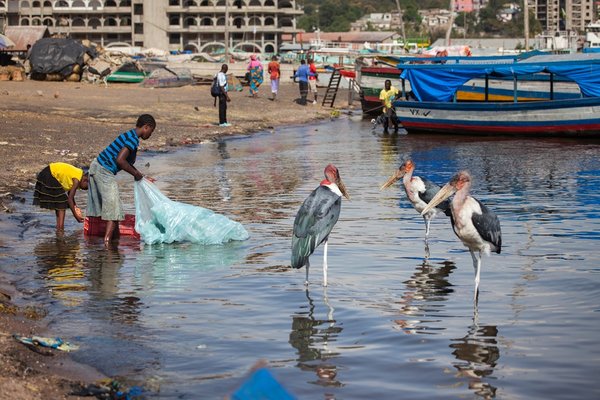 Read this article in French
Read this article in French- Share this article
- Subscribe to our newsletter
Reviving Lake Victoria – contributions from international cooperation
Lake Victoria is Africa’s largest lake and the second largest freshwater lake in the world. It is used commonly by three riparian countries: Kenya, Tanzania and Uganda. The lake’s catchment area extends to Rwanda and Burundi. This gigantic lake in East Africa provides 30 million people along its shores with a vital supply of water, it yields fish, and it serves as a transport route for shipping.
The ecosystem is threatening to collapse
The lake has already been in a poor state for years. Now this important ecosystem is threatening to collapse altogether. One problem is the huge spread of a water-lily species from South America which was brought to Rwanda and Burundi by these countries’ former Belgian colonial masters. These garden pond flowers deprive fish and insects living in the vicinity of the shore of their oxygen. Furthermore, owing to global warming, the water is heating up, and blue-green algae are multiplying ever faster, causing skin rashes and stomach and intestinal inflammations among humans as well as being lethal for many animals.
Another problem is that to many people, the lake is the “largest rubbish tip of their country”. Plastic bottles, plastic bags, car tyres and car batteries end up in Lake Victoria, as well as agrochemicals such as nitrogen compounds and phosphates coming from agriculture. And human faeces and untreated wastewater from urban areas and industry are discharged into the lake.
The environmental organisation Global Nature Fund already declared Lake Victoria the world’s most threatened lake in 2005.
The wide range of problems are further aggravated because population numbers are rising and internal migration is increasing in the region. More people are going to compete for the dwindling natural resources around the lake, which will inevitably have an impact on social coherence as well as people’s livelihoods, food security and adaptability.
Comprehensive and cross-country restoration efforts
For more than 20 years, efforts have been underway to revive the lake. However, these efforts are regional and focus on individual aspects. In order to really achieve large-scale sustainable results, the most important causes of pollution have to be addressed on a cross-country basis by targeted, long-term and comprehensive approaches – coordinated across administrative borders.
For example, the World Bank is supporting a programme with a volume of 30 million US dollars up to the end of 2025 which is financed by Cooperation in International Waters in Africa (CIWA). Known as Nile Cooperation for Climate Resilience (NCCR), it aims to assist the countries of the Nile Basin and along Lake Victoria in the areas of flood and drought hazards, water management and quality as well as waste management and strengthening the safety of dams. In addition, it seeks to improve cross-border cooperation and involve both interest groups and civil society.
The Lake Victoria Basin Commission (LVBC) is participating in implementation. The LVBC is the special institution of the East African Community (EAC) which coordinates the sustainable development and management of Lake Victoria in the five EAC partner countries.
Different needs in the region
Setting out from the approaches “Green, Resilient, and Inclusive Development” and “Citywide Inclusive Sanitation”, the World Bank is tackling a further problem for the lake: the discharge of untreated human waste. The programme is cooperating with the private sector in order to create “green jobs” for people along the sanitary services chain.
Commissioned by the European Union and the German Government, Germany’s KfW Entwicklungsbank is also supporting the common and sustainable management of Lake Victoria. The capacities of the commission for cross-border integrated water resource management are being strengthened. At the same time, the construction of infrastructure for wastewater disposal and water treatment plants with modern filtering technologies is being boosted.
Finally, “Internationale Zusammenarbeit (IZA) der Schweiz in der Region der Grossen Seen” (Swiss international cooperation [IC] in the Great Lakes region) is also present. With its approaches in combating poverty and for achieving peace, it complements the work of the World Bank and KfW. It strengthens governance, the protection of the civilian population, healthcare services and economic development. For example, Switzerland is supporting platforms for dialogue between the population and the government, in order to promote accountability and citizens’ ownership of decision-making processes. It accompanies elections and constitutional reform. And, in the wake of the Covid-19 crisis, it supports vocational education as well as small and medium-sized enterprises.
Damage to the gigantic body of water is threating millions of people’s livelihoods. But if the lake really can be “saved”, this inland sea has the potential to serve as an economic power centre in central Africa and liberate millions from poverty.
Patrik Berlinger is an expert on development policy and responsible for political communication at Helvetas. Contact: patrik.berlinger@helvetas.org
More information:
Link to Global Nature Fund
Link to «Green, Resilient, and Inclusive Development» und «Citywide Inclusive Sanitation»
Link to KfW
Link to Swiss Development Cooperation – Great Lakes region





Add a comment
Be the First to Comment